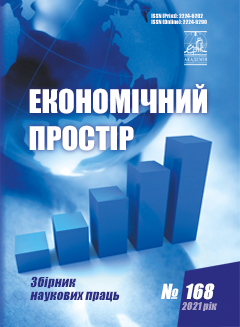METHODOLOGICAL FACTORS FOR THE DEVELOPMENT OF EUROREGIONAL COOPERATION
Abstract
The article examines the theoretical and methodological problems of euroregions. Theoretical and methodological foundations are studied through the prism of the role of regions in cross-border cooperation. Euroregions are the highest institutional form of cross-border cooperation. The role and place of euroregions in the system of cross-border cooperation are crucial. Currently, euroregions play an important role in creating favorable conditions for the development of relations between Ukraine and the EU. To do this, it is necessary to identify factors affecting the development of euroregional cooperation. Large-scale euroregional cooperation on the rights of free participation forms a kind of Free Trade Zones, where not only EU members, but also states that are members of euroregions (Ukraine, Moldova, Belarus) carry out their activities. But the most important thing is that large investments in the form of foreign direct investment are directed to these zones, which contributes to the recovery of these border areas and leads to the implementation of significant investment and integration projects in these territories. The development and implementation of fundamentally new approaches to the development of euroregions in Ukraine in the context of EU enlargement require radical changes in the geopolitical situation on the European continent and a change in the geopolitical status of euroregions after a large-scale expansion of the European Community. Today, Ukraine, adapting the pan-European principles of euroregional cooperation as much as possible, should not only use the generally accepted definitions and categories of cross-border cooperation as much as possible, but also implement them in detail. Thus, the new realities of an international nature in the XXI century in the context of the deepening and spread of the European integration process also determine the need for a qualitative change in the system of euroregional cooperation of Ukraine and the activation of the main subjects of cross – border relations-regions.
References
Handbook of Transfrontier co-operation for local and regional authorities in Europe. LACE Phare CBC, 1997. Р. 11–12.
Szul R., 2014, Chapter Seventeen Minorities, Regions, Migrants And Changes In Language Policies in Europe, [in:] The New European Frontiers: Social and Spatial (Re) Integration Issues in Multicultural and Border Regions, Cambridge, Cambridge Scholars Publishing.
Мікула Н., Толкованов В. Прикордонна співпраця. Київ : Крамар, 2011. 259 с.
Рогозян Ю. Нормативне забезпечення міжрегіонального співробітництва. Економіка та право. 2015. № 3(42). С. 70–76.
Стеченко Д.М. Розміщення продуктивних сил і регіоналістика. Київ : Вікар, 2006. 396 с.
Стрижкова А. Розвиток транскордонного співробітництва України в умовах нових геополітичних змін та підписання угоди між Україною та Європейським Союзом. Менеджер. 2015. № 1. С. 138–149. URL: http://nbuv.gov.ua/UJRN/Nzhm_2015_1_24 (дата звернення: 26.12.2019).
Дунська А., Жалдак Г. Соціальний капітал як ресурс для інноваційного розвитку підприємств. Вісник Хмельницького національного університету. Економічні науки. 2014. № 3(3). С. 95–99. URL: http://nbuv.gov.ua/UJRN/Vchnu_ekon_2014_3%283%29__21 (дата звернення: 26.12.2019).
Кіш Є.Б. Єврорегіон: теоретико-методологічні засади дослідження Регіональні студії. 2017. № 10. С. 76–81.
Handbook of Transfrontier co-operation for local and regional authorities in Europe. LACE Phare CBC, 1997. Рр. 11–12. (in English)
Szul R. (2014) Chapter Seventeen Minorities, Regions, Migrants And Changes In Language Policies in Europe, [in:] The New European Frontiers: Social and Spatial (Re) Integration Issues in Multicultural and Border Regions, Cambridge, Cambridge Scholars Publishing. (in English)
Mikula N., Tolkovanov V. (2011) Prykordonna spivpracya [Trans-border cooperation]. Kyiv: Kramar, 259 р. (in Ukrainian)
Rogozyan Yu. (2015) Normatyvne zabezpechennya mizhregionalnogo spivrobitnycztva [Normative provision ofinterregional cooperation]. Ekonomika ta pravo, vol. 3(42), pp. 70–76. (in Ukrainian)
Stechenko D. (2006) Rozmishhennya produktyvnyx syl ta krayeznavstvo [Placement of Productive Forces and Regional Studies]. Kyiv: Vikarij, 396 р. (in Ukrainian)
Stryzhkova A. (2015) Rozvytok transkordonnogo spivrobitnycztva Ukrayiny v umovax novyx geopolitychnyx zmin ta pid-py’sannya ugody mizh Ukrayinoyu ta Yevropejskym Soyuzom, Menedzher [Development of cross-border cooperation of Ukraine in the conditions of new geopolitical changes and signing of an agreement between Ukraine and the European Union], vol. 1, pp. 138–149. Available at: http://nbuv.gov.ua/UJRN/Nzhm_2015_1_24 (in Ukrainian)
Dunska A., Zhaldak G. (2014) Socialnyj kapital yak resurs dlya innovacijnogo rozvytku pidpryyemstv [Social capital as a resource for innovation development of enterprises]. Visnyk Xmelnyczkogo nacionalnogo universytetu. Ekonomichni nauky, vol. 3(3), pp. 95–99. Available at: http://nbuv.gov.ua/UJRN/Vchnu_ekon_2014_3%283%29__21 (in Ukrainian)
Kish E.B. (2017) Yevrorehion: teoretyko-metodolohichni zasady doslidzhenia [Euroregion: theoretical and methodological foundations of research]. Rehionalni studii, no. 10, pp. 76–81. (in Ukrainian)



